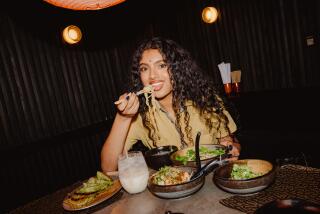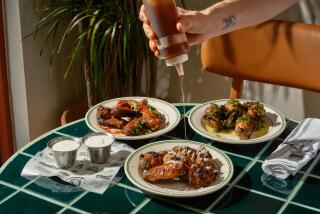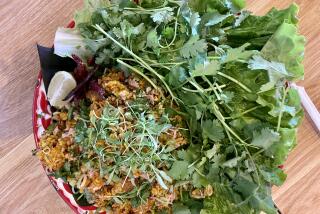How to Safely Enjoy India in All Its Many Flavors
- Share via
BOMBAY, India — That infamous ailment, “Delhi belly,” need not interrupt the pleasures of a trip to India. Common sense, a few precautions and careful choice of eating places will allow visitors to enjoy the richly varied cuisine without unpleasant aftereffects.
The key is to avoid improperly handled food and impure drinking water. That does not mean following a bland diet in Westernized dining rooms.
Many small, clean eating places offer great local flavor and wonderful food. It would be a shame to miss them. But draw the line at street food, no matter how appetizing.
In Bombay, white-collar workers eat freely from rickety stands at Nariman Point, the business district, because the area is short on restaurants. And well-to-do Bombayites rank certain street snacks among the city’s great dishes. But their systems have adjusted to this sort of food; yours has not.
Vegetarian Meals
Where and what you eat will not always be a matter of choice. Some tours last an entire day and deposit passengers at a restaurant or hotel for a lunch break. Sometimes there is a choice of menu and sometimes not, but the restaurant will be reputable even if modest.
During the long tours that I took to Cape Comorin at the southern tip of India and to Mahabalipuram in Tamil Nadu, the bus stopped at guest houses that served a set vegetarian meal. No cutlery was provided because we were expected to eat in the traditional way--with our hands.
On a first-class train trip from Mysore to Bangalore, breakfast was placed on board at one of the towns. The selection was limited to Indian vegetarian snacks such as idli , a sort of steamed bread eaten with spicy coconut chutney. The only fare when I rode second-class was the fruit I took on board.
Vegetarian dishes are good to order when unsure of a restaurant. These form the diet of much of India and are always available.
Some tips to remember:
--Never eat food that has been allowed to stand uncovered.
--Avoid seafood, which can be dangerous if not fresh.
--Stay away from greasy fried foods, and choose fruits such as bananas that can be peeled.
--Don’t drink water anywhere unless you are certain that it has been purified. There are plenty of other choices, among them freshly squeezed fruit juices, beer, coffee, tea and soft drinks. Trustworthy soft-drink brands include Limca, Thums Up, Gold Spot and Maaza.
At Cape Comorin I was warned not to drink local bottled beverages that imitated major brands but were likely to be impure.
Lime Soda Quencher
My favorite thirst quencher was the fresh lime soda, a combination of freshly squeezed lime juice, sugar syrup and bottled sparkling water. Many tourists select bottled Bisleri water, India’s answer to Evian.
On daylong tours in hot weather, carry Bisleri with you. A large bottle costs 50 to 75 cents, depending on where you buy it. The lids tend to come loose, so it is wise to transfer the water to a plastic jar with a tight-fitting screw top.
Water in major hotels is carefully monitored. Although you can’t brush your teeth with tap water, you can safely use water from the jug provided in the room.
At the Taj Residency in Bangalore, water is not only filtered and treated but tested for microbial content weekly by an outside agency.
“In a hotel like this I would say the water is as safe as anywhere in the United States,” said executive chef Anil Mohan.
But I know residents of Bombay who won’t take water or ice no matter how posh the establishment. And I draw the line at using ice from room refrigerators. A friend who became ill in New Delhi several years ago cited that as the cause.
Protect Reputation
Leading hotels take pains to ensure that food is safe. Their reputation depends on it. At the Taj Mahal Hotel in Bombay the fruits placed in guest rooms are washed in potassium permanganate; vegetables are washed in a chlorine solution and raw meat and chicken are placed in chlorine solution before they are portioned and frozen. Purified water is used for cooking as well as drinking.
Kitchens and restaurants are disinfected regularly, and both food handlers and food purveyors are checked for cleanliness.
Similar standards are maintained by all five-star hotels, according to Satish Arora, food development director and chef culinaire for the Taj Group of Hotels.
Contaminated food and water are not the only sources of illness. Fatigue, changes in climate, time zones and diet are other culprits. The long journey itself is tiring, so eat lightly at first and get plenty of rest.
Grill the Meat
For a safe dinner, Prakash Mallik, president of Bombay’s Hotel and Restaurant Assn., suggests ordering meat grilled in the intensely hot tandoor oven. Tandoori foods are easier on the stomach than Indian dishes, which combine many spices and are cooked with a liberal amount of oil or ghee liquid butter. End the meal with tea or coffee.
“If you drink something hot after meals, nothing can ever go wrong with your stomach,” said Mallik, who owns the Hong Kong restaurant, popular for Chinese food.
In Bombay, restaurants are graded by city officials, and the grade is sometimes posted. Class 1 eating places are top-notch. Class 2 restaurants offer fewer frills and Class 3 places are simpler yet. All are supposed to adhere to the same standards of cleanliness and safety, but rules can be flouted when inspectors aren’t watching.
I saw a waiter in a Class 2 cafe, in the heart of the tourist district, refill bowls of chiles with his hands. In another Class 2 restaurant the waiter was more careful, using tongs to place breads on the table.
Variety of Foods
During two months of travel in India I sampled a great variety of food, some of it in private homes where I had water-based drinks in order not to insult my hosts.
I drank tea everywhere--with rickshaw drivers at their hangout in Jaipur, at the railway station in Mysore, from a sidewalk vendor in Madras.
I ate raw vegetables in restaurants, and was lured by sweets in counters that also contained a few flies. Yet I never became ill.
Luck and a rugged system may have helped, but the food was generally well-prepared and restaurants were clean.
Travelers, however, should take certain precautions. Check with a physician before your trip. Have all recommended inoculations, and carry prescription medicines for intestinal ailments.
I also took vitamins daily and chewed Pepto-Bismol tablets because I had heard that they can act as a preventive. I can’t quote an authority on this, but the tablets are at least handy to carry and helpful in case of minor discomfort.
One last point: Carry all medicines with you. They’d be hard to replace if a suitcase were lost on the journey.
More to Read
Sign up for The Wild
We’ll help you find the best places to hike, bike and run, as well as the perfect silent spots for meditation and yoga.
You may occasionally receive promotional content from the Los Angeles Times.






